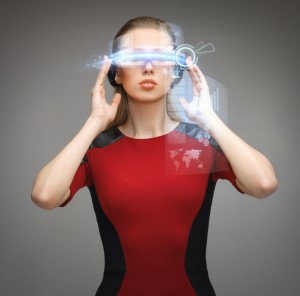Have We Got It All Backwards?

Don’t shoot!
The concept of cause-and-effect is very slippery. We think that A causes B only to find that C really causes both A and B. Or, perhaps it’s really B that causes A. More subtly, A might influence B which turns right around and influences A.
Lately, I’ve been thinking that we’ve been looking at a lot of things from the wrong end of the telescope. Some examples:
Our brain creates us – what creates our personality and the essence of who we are? Why our brains, of course. My brain is the cause; my personality is the effect. Further, the brain is what it is; there’s not much we can do about it. Well…not so fast. Maybe we got it backwards. It turns out that the brain is plastic; we can change it through our habits, actions, and thoughts. In many ways, we create our brains rather than the other way round. Norman Doidge is a leading writer on brain plasticity. You can find his books here and here.
Mutate first; adapt later – our general model of evolution suggests that random mutations happen in our DNA. Mutations that provide a competitive edge are then preserved and passed on. Mutations that aren’t so helpful just fade away. But, according to a recent article in New Scientist, we may have it backwards. Again, plasticity is a key concept. “A growing number of biologists think … plasticity may also play a key role in evolution. Instead of mutating first and adapting later, they argue, animals often adapt first and mutate later.”
I am the master of my fate – I used to believe that I was in control. Now I realize that my System 1 often makes decisions without any input from “me”. Indeed, I don’t even know the decisions are being made. But it’s not just my “primitive brain” that molds my behavior. It’s also how fast my heart beats and how healthy my vagus nerve is. But it’s not even just my body that steers me. It’s also the microbes in my gut. When the microbes team up, they can make me do bizarre things – like eating chocolate. They may even contribute to schizophrenia.
OCD starts with thoughts – we’ve always assumed that irrational thoughts create obsessive compulsive disorder. Irrational thoughts begin in the brain and radiate outward to produce irrational behavior. But, as Clare Gillan points out, we may have it backwards. When she induced new habits in volunteers, she found that people with OCD change their beliefs to explain the new habit. In other words, behavior is the cause and belief is the effect.
The gardener manages the garden – Suellen loves to garden and will spend hours at hard labor under a hot sun. When I see how hard she works, I wonder if she’s managing the flowers or if they’re managing her. It’s not a new thought. The Botany of Desire makes the same point.
What else have we gotten backwards? It’s hard to know. But, as the Heath brothers point out in Decisive, if you believe A causes B, you owe it to yourself to consider the opposite.
Are You The Boss Of You?

I am the master of my fate. Aren’t I?
Like so many teenagers, I once believed that “I am the master of my fate, I am the captain of my soul.” I could take control, think for myself, and guide my own destiny.
It’s a wonderful thought and I really want to believe it’s true. But I keep finding more and more hidden persuaders that manipulate our thinking in unseen ways. In some cases, we manipulate ourselves by mis-framing a situation. In other cases, other people do the work for us.
Consider these situations and ask yourself: Are you the boss of you?
- When you eat potato chips, are you thinking for yourself? Or is some canny food scientist manipulating you by steering you towards your bliss point?
- When you gamble in a casino, are you in control or is the environment influencing you to spend a little more and stay a little longer?
- When you eat chocolate, is it because you love the taste or because the microbes in your gut are controlling your behavior?
- When you play the slot machines, are you deciding how much to spend or is a sophisticated algorithm dispensing just enough winnings to keep you hooked? Are you being addicted in the machine zone?
- When you read social media, do you decide how long to stay on or does a slow, steady drip of dopamine keep you engaged?
- When you don’t eat fish for 20 years, is it because you’re allergic or did you just never think to test your own assumptions? Did you frame yourself?
- When you go rock climbing, is it because you’re an adventurous spirit or because your slow heart beat tilts your life towards cheap thrills (and perhaps a life of crime)?
- When you chat with people in your neighborhood, do they express a wide range of opinions or do they all think more or less like you? When you surf the Internet, do you read only items that you agree with? Will that make you crazy?
- When you vote for a political candidate, is it because you have carefully considered all the issues and chosen the best candidate or because a cynical communications expert has got your goat with attributed belittlement?
- When you vote for stronger anti-crime laws, is it because you think they’ll actually work or are you succumbing to the vividness availability bias? (Vivid images of spectacular crimes are readily available to your memory so you vastly over-estimate their frequency).
- Why are so many restaurants painted red? Why is the woman in the picture (above) wearing a red outfit?
- Is the future ahead of you or behind you? Why did you make that choice?
- When you make a big decision for your company, you never let your biases get in the way, do you? Yet when other people make big decisions, they’re biased most of the time, aren’t they?
- When you choose a mate, are you thinking clearly or is sociobiology influencing your behavior?
- Did you carefully consider and consciously choose those activities that arouse you sexually or was the decision made for you by some combination of hormones, psychology, and genetics?
- Is your primary responsibility as an inhabitant of a given country to be a good citizen or a good consumer?
- When you buy something is it because you need it or because you want it? Perhaps you’re being manipulated by Sigmund Freud’s nephew, Edward Bernays, the founder of public relations. Or perhaps you’ve been brandwashed.
In The Century of the Self, a British video documentary, Adam Curtis argues that we were hopelessly manipulated in the 20th century by slick followers of Freud who invented public relations. Of course, video is our most emotional and least logical medium. So perhaps Curtis is manipulating us to believe that we’ve been manipulated. It’s food for thought.
(The Century of the Self consists of four one-hour documentaries produced for the BBC. You can watch the first one, Happiness Machines, by clicking here).